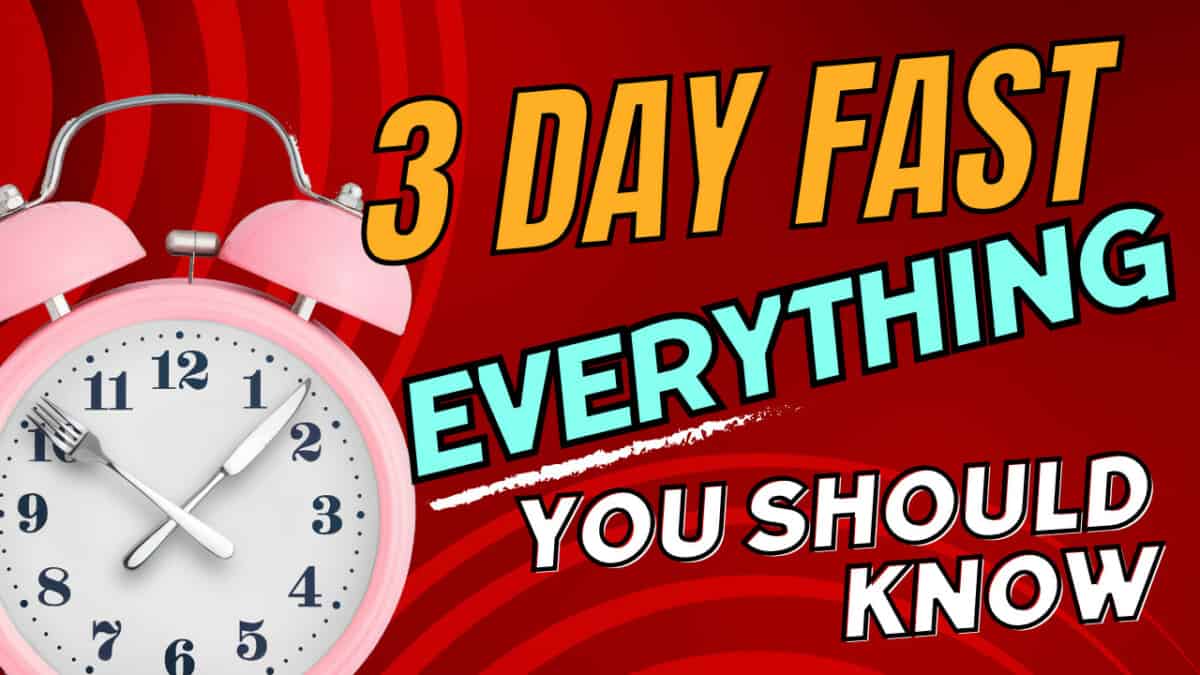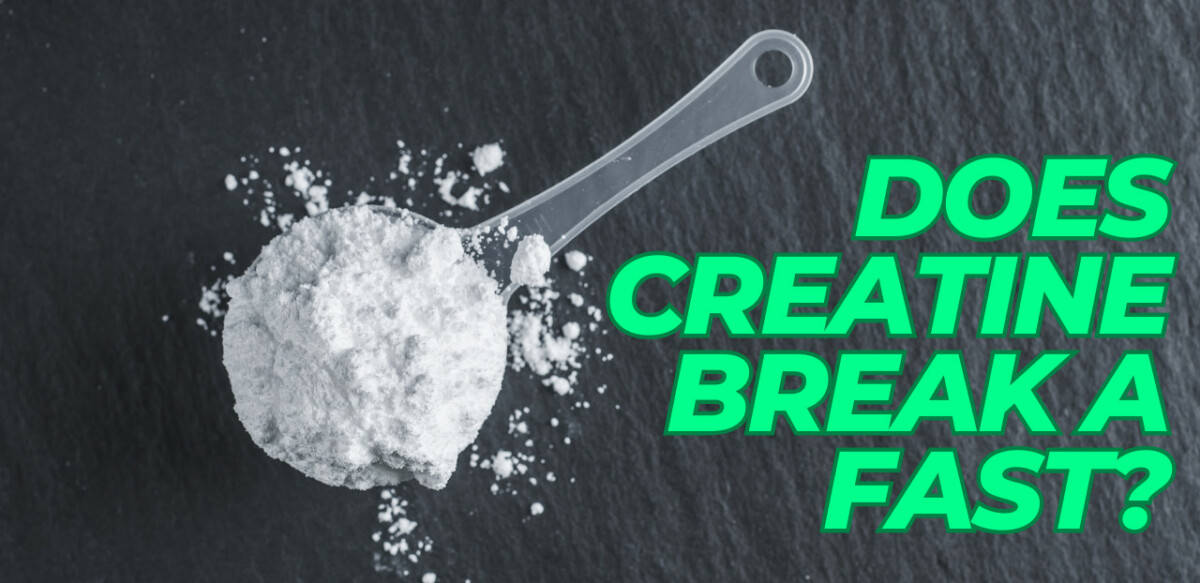Intermittent fasting might be a very popular and trendy diet, but that doesn’t mean it will work for everyone. So here I’m sharing why I stopped intermittent fasting but later restarted after learning from my mistakes.
It’s proven that intermittent fasting can work very well for weight loss1 and its other health benefits. But some downsides to fasting can ruin your results and turn your life into dieting torture.
With fasting, there are drawbacks and potential health concerns that you should know about, which made me rethink this popular diet. So if you’re not getting the results you want with fasting, you’re not the only one.
The stress, physical discomfort, and social impacts can throw off your results and make life not very fun. Once you understand the downsides and mistakes with intermittent fasting, you can uncover how to fix these problems to get better results quickly.
So keep reading to discover why I stopped intermittent fasting but then restarted once I fixed my mistakes and finally got real results.
The Truth About Intermittent Fasting

Like any diet, intermittent fasting has pros and cons that can make or break your results. So it’s important to know the pros and cons so you can make sure the diet is for you. Also, how to overcome many common mistakes with intermittent fasting.
One of the reasons I first stopped intermittent fasting was because I wasn’t losing weight despite doing 16/8 fasting consistently. But when I looked deeper, I realized that a few common problems could sabotage your results and stop you from losing weight (or worse).
These issues are important to know and address before starting intermittent fasting…
Fasting is Stress
Intermittent fasting involves avoiding all food outside of your eating window. If you’re used to eating all the time throughout the day, this can be stressful for your body and mind.
This can make life harder depending on other stresses in your life. For example, extra stress from fasting, on top of the stress from work, family, etc., can really increase your cortisol levels.
Cortisol is the stress hormone released from your body that can cause weight gain, especially in your belly.2 This can counteract the weight loss benefits of intermittent fasting and could end up causing you to gain weight instead.
Emotional Eating
The stress from intermittent fasting could also cause you to overeat during your eating window. It’s common for people to overeat when they’re stressed.
Comfort foods like pizza, potato chips, and ice cream are more likely to be eaten when someone is psychologically stressed out.3 Emotional eating is a common side effect of stress and could sabotage all your weight loss efforts.
If you’re not eating not consuming enough vitamins and minerals during your eating window, then this could cause you to feel tired and fatigued.4 Feeling tired can cause additional stress on top of the stress you already have.
But for some, being stressed causes them to eat less. Knowing if you’re an emotional eater or overeat due to high stress is important. So it’s a good idea to make sure you’re minimizing the stress in your life in general, especially with intermittent fasting.
Hunger Pains
If you’re not used to fasting and long periods without eating, this can cause serious hunger. Unfortunately, the hunger pains for many are the most challenging part of following any diet, and this is even more true when following a time-restricted eating diet like intermittent fasting.
I, like many, start to feel hungry all the time with intermittent fasting. While it’s nice not having to eat breakfast every day, there are times when the hunger was too much.
This can cause you to binge eat later in the day after your stomach starts to feel like a bottomless pit. Lunch hardly feels satisfying, then the afternoons are unbearable, and evening dinners can become larger and larger.
Getting “hangry” during the day can become very likely as you’re not only calorie counting but also following your fasting window. Irritability from hunger can cause a cortisol increase due to stress and limit weight loss.
This is why I recommend starting off on the low side of fasting windows with only 12-14 hours. From there, you can progress and work your way up to 16-20 hours of fasting. And fasting isn’t something that has to be done every day, but you can still get results in the long term when fasting just most of the time.
Not Sleeping Well
If you go to bed hungry, then it could cause hunger-induced insomnia.5 Constant hunger can be a physical and psychological stress that can worsen your sleep.
Starting your fasting window too early in the evening could cause you to feel hungry by the time you go to bed. Going to bed hungry is a bad idea since it can make it harder to fall asleep and stay in a deep sleep.
Your blood sugar can also dip too low when sleeping with a hungry stomach.6 With low blood sugar caused by hunger, your sleep will worsen, and you’ll wake up feeling tired and irritable the next day.
Getting enough sleep is an important part of the weight loss process. Without enough sleep, your metabolism can slow down, you’ll have less self-control the next day to stick to your fasting routine, and it’ll cause you to crave comfort foods.7
This is why I recommend having your last meal of the day later in the evening, around 8 pm. For most, this is the latest most eat anyway, and it’ll help keep you feeling fuller for longer up to bedtime.
The Dangers of Intermittent Fasting

Some long-term side effects from intermittent fasting can not only cause you to stop losing weight but have other potential adverse health impacts.
You can eventually stop losing weight with intermittent fasting, and it can lose its effectiveness. So if you’re wondering why intermittent fasting isn’t working anymore for weight loss, then you’re not the only one.
If you’ve hit a plateau with intermittent fasting and noticed some weight gain, this can be for a few reasons. For many, you may notice you’re not getting as much weight loss after 8-10 weeks of following this diet.
This is from a decrease in your metabolism (basal metabolic rate) which results in less fat and calorie burning in your body.8 Calorie restriction and too much fasting could actually cause you to plateau and become more metabolically inflexible.
Metabolic flexibility is when your body has an easier time using carbs and fat stores for energy. When you become metabolically inflexible, your body has a much harder time doing this, which makes it easier for you to gain weight.9
This is why it’s a good idea to not use strict fasting all the time and for too many hours. Short breaks from fasting, calorie restriction, and carbohydrate restriction can keep your body from becoming too stressed and metabolically inflexible.
Side Effects of Intermittent Fasting for Females

As a personal trainer and nutrition coach, I’ve talked to and worked with women with intermittent fasting. I’ve heard from women that fasting can throw their energy levels all over the place.
Feeling lightheaded and shaky during their fasting period is quite common, especially in the beginning. This can happen despite drinking enough water and making sure you’re getting enough electrolytes like magnesium.
Women’s menstrual cycles can also become more irregular with fasting.10 It’s best for women not to fast in the week before their period starts. But if you are fasting, you want to make sure you are keeping stress levels low, get enough nutrients, and sleep.
Suppose you feel lightheaded, shaky, dizzy, or nauseous during your fasting window. In that case, this is usually caused by low blood sugar levels. If your body is adapted to burning through carbs and sugars in the morning (“sugar burners”) for fuel, then it can cause your blood sugar levels to crash when you take them away.
This is why it’s a good idea to progress and increase your fasting window periods slowly. It’s also recommended to start progressively switching your body from eating too many carbs and sugars in the morning (and the rest of the day) and eating more protein, healthy fats, and vegetables.
What Happens if You Quit Intermittent Fasting

It’ll be hard for most to keep their weight lost once stopping intermittent fasting.
Why you can gain weight after stopping intermittent fasting…
The reason for this is simple: you’ll eat an extra meal or two during the day by not following intermittent fasting.
One of the main reasons intermittent fasting is so effective for weight loss is that it restricts your eating. This will instantly cut out at least one meal and help to prevent snacking. Knowing you’re not allowed to eat during certain times helps restrict calories consumed.
But it’s easy to start overeating once you stop intermittent fasting. If you stop fasting, it’s a good idea to keep your calorie intake at a level that will help you lose weight. Make sure you’re also watching your food intake and not eating processed, high-calorie, sugary, or refined foods.
When you stop intermittent fasting, you can also find yourself feeling hungry throughout the day. One of the big benefits of fasting that you don’t hear is that it ends up lowering your hunger levels.
At first, with fasting, you’ll notice you’re hungrier more often because your body is used to eating. But the longer you keep fasting over time, the more it’ll shrink your stomach, and your hunger hormones like ghrelin will also adjust and end up lower.
So if you quit fasting, you might not be as hungry in the morning, but if you’re only eating three small meals during the day, it could cause you to feel very hungry between them. This is when snacking can become a big problem and is one of the biggest causes of weight gain.
Why I Started Intermittent Fasting Again

There were a handful of reasons why I quit intermittent fasting in the first place, like hunger pangs, stress, emotional eating, and sleeping issues. But after some time off, I’ve since restarted intermittent fasting after fixing these problems.
With hunger being the biggest issue, I wanted to address this first. When I decided to restart fasting, I gradually worked my way up with my fasting window. Instead of starting with 16 hour fast, I started with 12 hours my first week, 13 hours my second week, etc.
This made it considerably easier to adjust to the fasting schedule. I didn’t notice myself getting as hungry or lightheaded in the mornings as before. I also started using fasting drinks to curb hunger and increase my results.
Adding in C8-MCT coffee creamer to my morning coffee helped a lot. It quickly cut down on my hunger, and I noticed even an energy boost and better mental clarity. I’m drinking more water which hydrates you and also lowers hunger levels. And I’ll even drink some unsweetened green tea in the later morning to help keep powering through the end of the fast.
Support Many of the Keto Benefits Associated With Increased Ketones, & Support Them FAST, but Without the Difficulty of Doing Keto...
Increase Ketone Levels Inside Your Body to Boost Metabolism, Elevate Energy & Enhance Mental Focus
- 3X Better Than Coconut Oil, Butter or MCTs
- Heightened energy levels
- Reduced cravings & appetite
- Graceful aging
- Healthy metabolism
- Increased mental clarity & focus
- Heightened physical performance and recovery
Having a bigger meal for my last meal of the day also helped me feel fuller through the night. This way, I felt like I got to reward myself after a long day and eat a bigger meal with the family. I’ve noticed I sleep better and don’t feel as hungry the next morning, having my biggest meal for dinner.
And with fasting, I like how it stops you from snacking and eating extra calories. Snacking is one of my (and most) biggest problems with dieting. It’s also easier only having two or three meals during the day than three and a couple of snacks.
Fasting has taught me discipline and restraint. It lets me learn when to eat when I’m hungry instead of just stressed, sad, bored, lonely, etc. I’ve found it’s a great way of controlling hunger once you get a few things down, like fasting drinks and eating a bigger meal for dinner. I also sleep better since I’m not snacking so late at night.
Is It OK to Intermittent Fast Forever?
I’ve realized I don’t have to fast every single day of the week. While I fast most of the time, I’ll take a day or two off to give myself a break. Fasting too much all the time can lower your metabolism and make you less metabolically flexible.
Fasting too much all the time can eventually make your body less efficient with burning fat stores and carbohydrates for fuel. As a result, your body can adapt to thinking it has to hold onto fat stores and deposit carbs as fat since you won’t have access to food.
Now this will only really happen if you’re fasting all the time and after a long period of time. Most will benefit from fasting more often than not. But fasting isn’t something you have to do every day or forever, for that matter.
16 hours for many will be the magic number for fasting. At 16 hours, you’ll still get many fat-burning benefits while preserving muscle mass. And 16 hours is a sustainable time to fast often without it wearing you down. You can still have lunch and aren’t limiting yourself to only one meal a day, like 23 hours a day fast.
Make sure you get enough calories and micronutrients in the other two to three meals you’re eating during your feeding window. It’s easy to start becoming deficient in micronutrients if you’re not eating a well-rounded diet the rest of the time. Eating fewer calories shouldn’t come at the expense of losing nutrients.
Try taking a greens powder to help cover your micronutrient needs if you need to eat more fruits and vegetables.
Conclusion
To wrap it up, the most common reasons most stop intermittent fasting are hunger and stress, and it not fitting their schedules. But fasting also has a lot of benefits, including weight loss, that you can use to get results.
The trick is to fix these problems, making it easier for you to adapt to fasting and the schedule. And while some like to fast all the time and for long periods, you don’t have to. Fasting can be used as a tool, and you can use it often, but it doesn’t have to be every day.
If you have or have had an eating disorder, then you have to be very careful with fasting. Time restricted eating could trigger eating disorders if this is something you have suffered from before.11 Binge eating during your eating windows can happen, which is why it’s a good idea to progress into fasting.
Fasting does have problems and even side effects you should know about before or if you’re looking to restart it again. Once you know about these problems, you can work on creating solutions to make it easier to fast and get results. You can lose weight, teach your body to eat fewer calories, and live a healthy lifestyle without killing yourself in the process.
Josh holds a Bachelor’s degree in Exercise Physiology and Nutrition Science. He’s a Certified Strength and Conditioning Specialist (CSCS) by the National Strength and Conditioning Association and he’s a Certified Personal Trainer (CPT) by American Council on Exercise. He’s worked as a Strength and Conditioning Coach at the high school and college levels. He has over 15 years of experience as a personal trainer and nutrition coach. He strives to bring inspiration and results for people to live healthier lives through smart diet and exercise.











